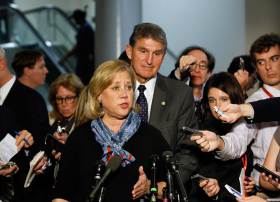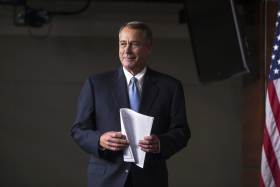After extending their party’s House majority to the largest margin in decades, the top Republican Congressmen will all return to leadership roles for another two years.
House Speaker John Boehner, Majority Leader Kevin McCarthy, Whip Steve Scalise and Republican Conference Chairman Cathy McMorris Rodgers all ran unopposed. National Republican Conference Chairman Greg Walden will continue to serve as the head of the effort to elect more House Republicans. The leadership election reaffirmed the election this summer following the primary loss of former House Majority Leader Eric Cantor.
Despite her party’s losses, House Minority Leader Nancy Pelosi is all but certain to win reelection to her post on November 18. She lived up to her reputation as a fundraising powerhouse, raising over $100 million for Democrats this cycle.
Across the Capitol, Senate Democrats and Republicans voted Thursday to keep Nevada Senator Harry Reid and Kentucky Senator Mitch McConnell as their parties’ leaders.





